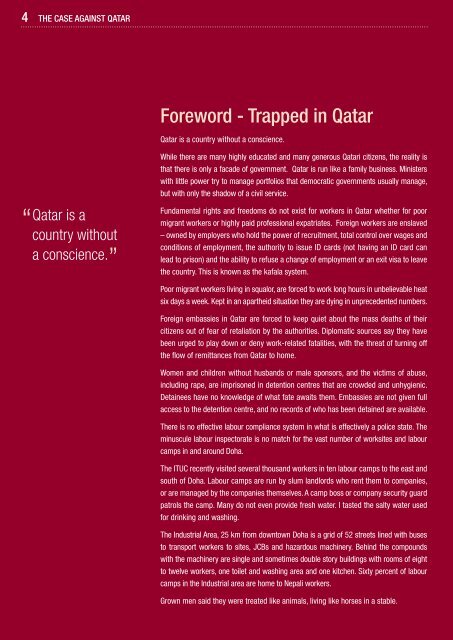11t5l
11t5l
11t5l
Create successful ePaper yourself
Turn your PDF publications into a flip-book with our unique Google optimized e-Paper software.
4THE CASE AGAINST QATAR4 THE CASE AGAINST QATARForeword - Trapped in QatarQatar is a country without a conscience.While there are many highly educated and many generous Qatari citizens, the reality isthat there is only a facade of government. Qatar is run like a family business. Ministerswith little power try to manage portfolios that democratic governments usually manage,but with only the shadow of a civil service.“Qatar is acountry withouta conscience.”Fundamental rights and freedoms do not exist for workers in Qatar whether for poormigrant workers or highly paid professional expatriates. Foreign workers are enslaved– owned by employers who hold the power of recruitment, total control over wages andconditions of employment, the authority to issue ID cards (not having an ID card canlead to prison) and the ability to refuse a change of employment or an exit visa to leavethe country. This is known as the kafala system.Poor migrant workers living in squalor, are forced to work long hours in unbelievable heatsix days a week. Kept in an apartheid situation they are dying in unprecedented numbers.Foreign embassies in Qatar are forced to keep quiet about the mass deaths of theircitizens out of fear of retaliation by the authorities. Diplomatic sources say they havebeen urged to play down or deny work-related fatalities, with the threat of turning offthe flow of remittances from Qatar to home.Women and children without husbands or male sponsors, and the victims of abuse,including rape, are imprisoned in detention centres that are crowded and unhygienic.Detainees have no knowledge of what fate awaits them. Embassies are not given fullaccess to the detention centre, and no records of who has been detained are available.There is no effective labour compliance system in what is effectively a police state. Theminuscule labour inspectorate is no match for the vast number of worksites and labourcamps in and around Doha.The ITUC recently visited several thousand workers in ten labour camps to the east andsouth of Doha. Labour camps are run by slum landlords who rent them to companies,or are managed by the companies themselves. A camp boss or company security guardpatrols the camp. Many do not even provide fresh water. I tasted the salty water usedfor drinking and washing.The Industrial Area, 25 km from downtown Doha is a grid of 52 streets lined with busesto transport workers to sites, JCBs and hazardous machinery. Behind the compoundswith the machinery are single and sometimes double story buildings with rooms of eightto twelve workers, one toilet and washing area and one kitchen. Sixty percent of labourcamps in the Industrial area are home to Nepali workers.Grown men said they were treated like animals, living like horses in a stable.


